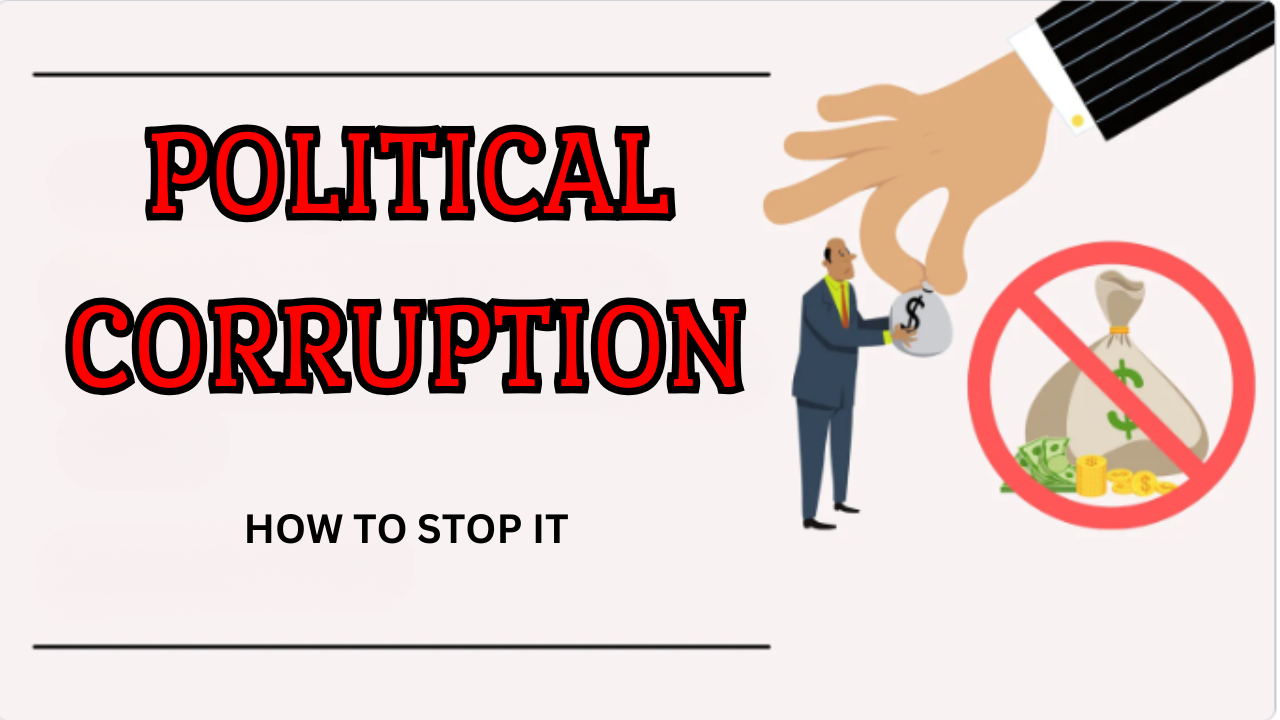“A wicked citizen cannot do evil in a republic that is not corrupted.” Political corruption is a widespread issue that affects countries worldwide. It undermines trust in government, reduces resources, and slows down development. This article explores the nature of political corruption, its impact, and strategies to combat it effectively.
Understanding Political Corruption:
Political corruption is how one often describes the abuse of a position of power for personal and individual gain. This includes taking or giving corrupt money, embezzling money from institutions, nepotism, and fraud. Corruption is not limited to the political world: it can occur in schools, sports, businesses, and religious institutions.
Historical Background of Corruption:
Corruption has been ravaging societies since ancient times. In ancient Greece, the infamous Alcmaeonid clan bribed the priestesses of Delphi into making false prophecies on their behalf. The “Arthasastra,” an ancient Indian political work from the 3rd century BCE, outlines 40 forms of embezzlement. So, corruption may not be that new after all but a regular problem.
Factors of Political Corruption:
While greed is indeed what drives corruption, individual reasons for such behavior are often multifaceted. Economic pressure can be seen in the situation between civil servants who are underpaid and expecting much from their families. Moreover, weak enforcement and exploitation of loopholes in anti-corruption laws can develop a culture of corruption.
Political Corruption Impact:
Corruption has a ripple effect. It breaks down the confidence of the public in the government, drains resources, and hampers development. For instance, in 2009, several British MPs were found to have spent taxpayer money on personal needs, causing an outcry in the public. In Baltimore, widespread corruption in the police department had cost millions to the taxpayers and dented public confidence.
Strategies to Tackle Political Corruption:
Strengthening Legal Frameworks:
Effective anti-corruption laws are necessary to discourage corrupt practices. Such laws should impose heavy penalties for corruption and be strictly implemented. Moreover, legal loopholes that enable corrupt practices must be closed.
Promotion of Transparency:
Transparency is a very effective weapon against corruption. The government must make budgeting and financial transactions transparent. Public access to information and support for freedom of the press is essential to check the officials.
Encouraging Citizenship:
Citizens have to fight graft. Citizens, for instance, can contribute by voting against corrupt leaders and demanding transparency. Education on citizenship and campaign for civic rights will enable more citizens to acknowledge and report malpractices.
Strengthening Institutions:
Effective anti-graft institutions come with a strong judiciary, effective policing, and anti-corruption agencies, among others. Anti-graft structures must be unfettered in the political spheres and well-provisioned.
International Cooperation:
Corruption tends to cut across borders, thus international cooperation is called for. The countries should be able to follow up and retrieve the stolen assets, share best practices, and support global anti-corruption efforts.
Case Studies of Successful Anti-Corruption Efforts:
Botswana:
Botswana has managed to build public trust through a commitment to transparency and swift action against corruption. The government responds openly and decisively to allegations of corruption, hence setting a high standard for accountability.
Denmark:
In Denmark, ministers of the government are required to report their entertainment, official travel, and gifts received monthly. This makes it difficult for corrupt practices to take place and increases public confidence.
South Africa:
Mcebisi Jonas, the deputy finance minister in South Africa, turned down a $45 million bribe from the influential Gupta family. Jonas continued to speak out despite threats to his life, revealing a network of corruption that brought about major political reforms.
The Role of Technology in Anti-Corruption:
Technology may be an invaluable tool in fighting corruption. Digitization increases transparency and simplifies the process, with fewer chances of corrupt activities being carried out. For instance, e-governance may open up public services to everyone with minimal or no intermediaries that may be used by corrupt officials for their selfish advantages.
The Protection of Whistleblowers:
Whistleblowers are very important in exposing corruption. Protecting whistleblowers from retaliation is very important to encourage reporting of corrupt activities. Legal frameworks should provide robust protection and support for whistleblowers.
The Role of Education in Preventing Corruption:
This is a long-run strategy against corruption because education from a tender age instills values of integrity and ethics in people. Anti-corruption education can be integrated into the school curricula. Public officials can also be trained on issues that raise public awareness and promote ethical behavior.
Conclusion:
Political corruption is a complex and widespread issue that requires a versatile approach to combat it effectively. Strengthening legal frameworks, promoting transparency, encouraging civic engagement, and leveraging technology are crucial strategies. By learning from successful case studies and fostering international cooperation, we can make significant strides in the fight against corruption. Ultimately, the collective efforts of governments, institutions, and citizens are essential to create a more transparent and accountable world.
FAQs:
1. What is political corruption?
Political corruption is the misuse of a position of power for personal gain.
2. What are common forms of political corruption?
Common forms include bribery, embezzlement, nepotism, and fraud.
3. How does corruption impact society?
Corruption erodes public trust, depletes resources, and hinders development.
4. What role do citizens play in combating corruption?
Citizens can vote out corrupt officials, demand transparency, and report corruption.
5. How can technology help combat corruption?
Technology can enhance transparency, streamline processes, and reduce opportunities for corruption.
6. Why is whistleblower protection important?
Protecting whistleblowers encourages reporting of corrupt activities and helps expose corruption.
